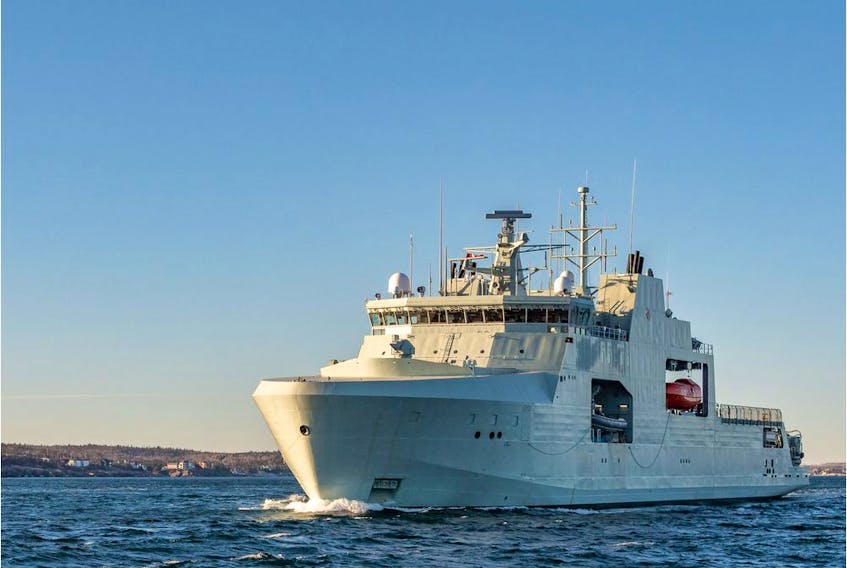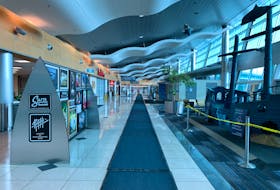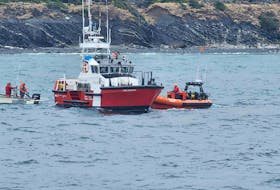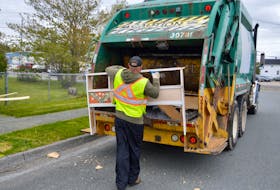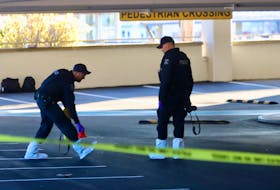Note: this article has been changed to reflect the actual time and day HMCS Harry DeWolf left Halifax after repairs were made to the new warship. Inaccurate information was initially provided by the navy.
The Royal Canadian Navy’s first new warship in more than two decades had problems with its military communications system during sea trials late last week that left the crew communicating with navy brass ashore using the onboard wifi.
HMCS Harry DeWolf also had trouble Thursday producing fresh water with the reverse osmosis system aboard the first of the navy’s six arctic and offshore patrol ships. While engineers were able to fix the water-making system overnight, the ship returned to Halifax for repairs Friday with a tug assist.
“They were not towed in,” navy spokesman Maj. Mark Gough said in an email about the incident.
While alongside, Harry DeWolf “received support returning sufficient military communications however experienced some mechanical issues with their motor diesel generator cooling systems,” Gough said.

That delayed their departure until about 3:30 p.m.Saturday.
“Required repairs were carried out and (Harry DeWolf) returned to sea ... to continue progressing their basic single ship readiness training program,” Gough said.
"In a nutshell, the ship’s company is now taking (Harry DeWolf) through its paces and various inspections, tests, and trials are underway to ensure the ship meets technical design requirements, and is ready to safely proceed to sea. As with any shipbuilding project, post-acceptance work is required to finalize construction and operationalize the platform. During this stage, the ship will undergo final preparations, including the outfitting and integration of onboard systems to meet RCN operational requirements.”
The ship’s captain was not available for an interview.
The most troubling item on the list of problems that required repairs is the communications issue, said Ken Hansen, a retired navy commander living in Dartmouth.
“That’s very interesting because the one thing you learn from a career at sea is that if anything can mess up your day it’s going to be comms. That will be a huge fly in the ointment unless they sort it out,” Hansen said.
Half of the cooling systems for the ship’s four 3.6-megawatt generators weren’t working properly Friday.
“There was an issue with two of the four,” Gough said. “They had a mechanical seal fail for their high temperature coolant pumps so those two pumps were completely changed out when they came back alongside on Friday.”
Because there are multiple generators aboard, Hansen wasn’t as concerned to hear about that problem.
“You always build these ships with redundancies so you’ve got not just one diesel generator but multiple diesel generators and cooling systems for each one,” Hansen said. “So if one of them isn’t working, it’s not crippling.”
The ship employs a reverse osmosis system to make fresh water from sea water.
“It’s state-of-the art, but they’re in common usage around the world,” Hansen said. “Again, you should have more than one and the reason you design ships with redundancies is so you have a fall back so that when you’re in a place like the high Arctic or the far western Pacific you’re not going crippled if one thing goes down,” Hansen said.
He suspects the captain decided to bring the ship back to port late last week out of an abundance of caution. “It sounds to me it was a lot of cautiousness with the exception of the communications thing. The communications thing is important.”

For the navy, the sea trials are crucial for a couple of reasons, Hansen said.
“One is if a problem arises, they have to go back to the builder because the acceptance trials already happened,” he said. “The ship got transferred to the navy, the acceptance trials are done, so if there is some fault or defect then they have to go back to Irving and get it fixed.”
The second reason these trials are so important is “it’s kind of a proof of concept thing for the navy,” he said.
Navy brass needs to know they have the right number of people aboard with the required skills to operate the ship, Hansen said.
“All that stuff gets tested as they go along and so those would be the kind of things that the navy would change. They have it within their power to put either higher or lower ranked people (aboard), people with different skill sets – they would scrounge them up and reassign them.”
Any problem that arises with the ship itself will need to be remedied in the other five arctic and offshore patrol ships that Irving is building at Halifax Shipyard, he said.
It’s not uncommon to see problems crop up in the first ship of any class, Hansen said. “Historically speaking, the first ship of any new class has a lot of teething problems – a lot.”
Hansen pointed to the St. Laurent-class destroyers employed by the navy from the mid-1950s to the mid-1990s. “The first of that steam class of destroyers – those troubles plagued her her entire career. In fact she was paid off early because she was such a headache.”

He doesn’t expect that to be the case with the Harry DeWolf.
“As I understand it, the design software, the cutting and assembly process – all of that has all been top notch,” Hansen said.
“If there was a problem at sea that’s not related to technical issues and it is related to human issues then this one’s on the navy. It’s their problem.”
He suspects the Harry DeWolf’s return to port last week during sea trials was precautionary.
“They ran into a problem and they said, ‘You know what, it will be better if we don’t push the system, get some help getting in and check it over,’” Hansen said.
Irving is building a total of six of the arctic and offshore patrol ships for the navy and two more “of some kind of a modified version” for the coast guard, he said.
The cost is expected to be about half a billion dollars per ship, he said.
“I heard the president and CEO of the shipyard say that by the time they get to the last ship in the run of six they expect to have their costs down to about $400 million,” Hansen said.
There would be “a ton of pressure” on the navy to make sure the ships work properly, he said.
“Not only does it represent a new ship type, but it represents a whole new scheme and design of employment. This ship’s going to take on new missions and tasks. It’s going to go about solving those tasks in different ways. It’s going to operate new equipment that will be put on board the ship.”
The ships will be expected to sail to the high Arctic in ice, he said.
“There is extra accommodation for co-operative employment with fisheries or some kind of science venture. There are a ton of new things going to happen on this ship with containerized laboratories and close co-operation with coast guard.”

